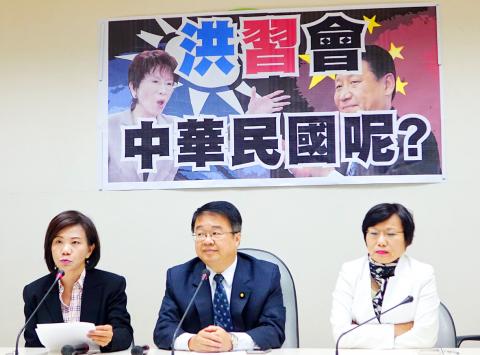Chinese Nationalist Party (KMT) Chairwoman Hung Hsiu-chu (洪秀柱) failed to defend the nation’s sovereignty by not mentioning the Republic of China (ROC) in her meeting with Chinese President Xi Jinping (習近平) in Beijing on Tuesday, the Democratic Progressive Party (DPP) caucus said yesterday, adding that the meeting stressed the “one China” framework of the so-called “1992 consensus.”
The existence of the ROC was again omitted from the annual get-togther between the KMT and the Chinese Communist Party (CCP), as Xi reiterated the “one China” principle and Hung left Xi’s statements unchallenged, DPP caucus chief executive Wu Ping-jui (吳秉叡) said.
The KMT has formulated the “1992 consensus” as being “one China, with different interpretations,” but there is never room for the interpretation under China’s assertion of the “one China” principle, Wu said, criticizing Hung for failing to mention the ROC during the meeting.

Photo; Liu Hsin-de, Taipei Times
The “1992 consensus” refers to a supposed tacit understanding between the KMT and the Chinese government that both sides of the Taiwan Strait acknowledge that there is “one China,” with each side having its own interpretation of what “China” means.
Former Mainland Affairs Council chairman Su Chi (蘇起) said in 2006 that he had made up the term in 2000.
Xi did not make specific responses to Hung’s requests at the meeting. At a welcome dinner in Nanjing on Monday, China’s Taiwan Affairs Office Minister Zhang Zhijun (張志軍) said it was difficult for Beijing to make concessions to the eight Taiwanese cities and counties whose government leaders made a visit to China in September to seek tourism and business opportunities under the “1992 consensus.”
“It shows that the ‘1992 consensus’ and cross-strait interactions preconditioned by the ‘consensus’ are not a cure-all,” Wu said. “Groveling [to China] will not ensure any gain.”
Hung mentioned the ROC during a visit to the mausoleum of ROC founder Sun Yat-sen (孫逸仙) in Nanjing on Monday, but the ROC, as the nation’s official title that represents a democracy of 23 million people, was missing throughout the rest of Hung’s trip to China, DPP Legislator Yeh Yi-jin (葉宜津) said.
“To normalize interaction, the ROC’s existence and Taiwan’s values of democracy, freedom and human rights have to be recognized,” Yeh said.
China also barred reporters from three Taiwanese media organizations from attending the Hung-Xi meeting, but Hung regrettably did not make any comment about freedom of the press, Yeh added.
Meanwhile, Hung’s proposal of a peace accord and the mentioning of the KMT’s “peace-centered policy platform” were an apparent attempt to seek an alliance with the CPP against the DPP, as the policy platform was formed in opposition to the DPP’s independence platform, DPP Legislator Tuan Yi-kang (段宜康) said.
“[Hung] does not have to propose a peace platform,” Tuan said. “[She] could have just asked Xi to invade Taiwan.”

FORCED LABOR: A US court listed three Taiwanese and nine firms based in Taiwan in its indictment, with eight of the companies registered at the same address Nine companies registered in Taiwan, as well as three Taiwanese, on Tuesday were named by the US Department of the Treasury’s Office of Foreign Assets Control (OFAC) as Specially Designated Nationals (SDNs) as a result of a US federal court indictment. The indictment unsealed at the federal court in Brooklyn, New York, said that Chen Zhi (陳志), a dual Cambodian-British national, is being indicted for fraud conspiracy, money laundering and overseeing Prince Holding Group’s forced-labor scam camps in Cambodia. At its peak, the company allegedly made US$30 million per day, court documents showed. The US government has seized Chen’s noncustodial wallet, which contains

SUPPLY CHAIN: Taiwan’s advantages in the drone industry include rapid production capacity that is independent of Chinese-made parts, the economic ministry said The Executive Yuan yesterday approved plans to invest NT$44.2 billion (US$1.44 billion) into domestic production of uncrewed aerial vehicles over the next six years, bringing Taiwan’s output value to more than NT$40 billion by 2030 and making the nation Asia’s democratic hub for the drone supply chain. The proposed budget has NT$33.8 billion in new allocations and NT$10.43 billion in existing funds, the Ministry of Economic Affairs said. Under the new development program, the public sector would purchase nearly 100,000 drones, of which 50,898 would be for civil and government use, while 48,750 would be for national defense, it said. The Ministry of

SENATE RECOMMENDATION: The National Defense Authorization Act encourages the US secretary of defense to invite Taiwan’s navy to participate in the exercises in Hawaii The US Senate on Thursday last week passed the National Defense Authorization Act (NDAA) for Fiscal Year 2026, which strongly encourages the US secretary of defense to invite Taiwan’s naval forces to participate in the Rim of the Pacific (RIMPAC) exercise, as well as allocating military aid of US$1 billion for Taiwan. The bill, which authorizes appropriations for the military activities of the US Department of Defense, military construction and other purposes, passed with 77 votes in support and 20 against. While the NDAA authorizes about US$925 billion of defense spending, the Central News Agency yesterday reported that an aide of US

The combined effect of the monsoon, the outer rim of Typhoon Fengshen and a low-pressure system is expected to bring significant rainfall this week to various parts of the nation, the Central Weather Administration (CWA) said. The heaviest rain is expected to occur today and tomorrow, with torrential rain expected in Keelung’s north coast, Yilan and the mountainous regions of Taipei and New Taipei City, the CWA said. Rivers could rise rapidly, and residents should stay away from riverbanks and avoid going to the mountains or engaging in water activities, it said. Scattered showers are expected today in central and